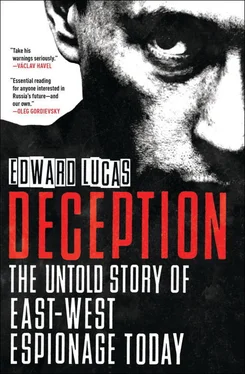A nerve-wracking period of ultra-discreet observation and analysis followed, involving at its peak counter-espionage officers of more than a dozen countries. One avenue was electronic: trying to snoop into the Russian’s computer in Madrid. Another was the paper trail: discreetly checking up on his documentation and aliases. A third was to obtain his DNA and compare that with databases of other known agents. Only a handful of people in Estonia knew the truth: their tricky task was to maintain absolutely normal relations with a man they once trusted, but now detested. An operational headquarters for the spy-hunt was established at a CIA base in a converted riding stable in Antaviliai, 20km outside Vilnius. 11
Simm claims that ‘one and a half years’ before his arrest he had picked up signs in NATO that the information he was passing to Moscow was attracting attention in the West. He sensed a change of atmosphere in Tallinn. And he believed (rightly) that he and Antonio had been under observation at a meeting in the Latvian capital, Riga. He says he tried, but failed, to make discreet contact with a Western secret service, presumably with an offer to be a triple agent: for whatever reason, this approach was rebuffed. In January 2008 Antonio reported to Moscow that his source was ‘in a panic’. 12At the penultimate meeting in Stockholm later that year, Simm began to suspect that his Russian handlers were hanging him out to dry. While continuing to urge Simm to seek a job in Estonia’s foreign intelligence service, Antonio responded to his tales of woe with a blunt ‘that’s your problem’. He turned down his agent’s request for emergency exfiltration to Russia, and informed him that the colonel’s rank he had been promised when recruited was no longer available, let alone the major-general’s rank to which he believed he had been promoted. The system, Antonio explained blandly, had changed.
The disillusion was not sudden. Simm claims that he wanted to stop spying as early as 2005. After stepping down as the National Security Authority in 2006, he had worked as an adviser on special projects, such as organising NATO meetings in Tallinn, and handling Estonia’s contribution to the war in Afghanistan. He had made this career move – he says – without consulting Antonio, who had been furious when he heard. In his final meeting with Antonio in June 2008, Simm gave him a blunt message to pass to Moscow: ‘that I was retired, had no access, was not working’. He received no response, returning to Tallinn crestfallen and worried. Far from facing a comfortable retirement as a general in the SVR, he was a mere paid traitor, and a clapped-out one at that. His access to important secrets was gone; he was on the brink of retirement, and at risk of discovery. On 16 September 2008 Antonio then inexplicably compounded the danger by telephoning him on his mobile phone and cancelling a meeting, claiming to be ill. Simm’s phone was already tapped by the spycatchers of Kapo, which had secretly opened a criminal case on 26 May 2008, and had been collecting the evidence necessary for a treason trial. The trap was ready to be sprung.
The Rõõmu (pleasure) shopping centre in Keila is like many others in small-town Estonia. The supermarket boasts a good selection of wines (Estonians are fond of beefy New World reds), automatic checkouts (Estonians like gadgets) and a well-stocked cake shop. On 19 September 2008 Simm and his wife headed there to collect a three-kilogram kringel (iced cinnamon pastry) they had ordered to celebrate his mother-in-law’s upcoming birthday. As the couple emerged from the building carrying their shopping, they looked like any married couple preparing for a comfortable and untroubled family weekend. In the bustle of a Friday afternoon, neither of them noticed a black VW minibus parked discreetly near by, or the ambulance waiting around the corner in case Estonia’s most-wanted man violently resisted arrest, collapsed, or took poison. The Kapo officer [73] bt I am withholding his name, in accordance with the sensible convention that serving intelligence and security officers should not be identified.
who placed them there was a seasoned veteran of the service’s toughest operations against Russian organised crime. But this arrest was to be the most important event of his career. It had been meticulously planned, in close cooperation with counter-espionage officers from friendly foreign services. Simm’s treachery was humiliating: a flawless arrest and prosecution would go some way to redress the balance. ‘We wanted it quiet, no conflicts and the goal was immediate cooperation,’ recalls the Kapo officer. The first moments would be crucial: ‘You cannot rewind if you make a mistake.’ Showing his badge, he approached his target: ‘I need a couple of words.’ Simm seemed unbothered: he knew the Kapo officer and assumed it was some minor query to do with security at the ministry. In a few seconds, Simm was sitting in the minibus, with his wife whisked away to a nearby car, where she was told ‘just wait quietly’. She assumed it was a mistake: her husband had not worked full-time in the Defence Ministry since April.
In the minibus came the thunderbolt: ‘Mr Simm – you are under arrest on suspicion of treason.’ Simm was familiar with handcuffs, but not with the sensation of being handcuffed. He started sweating, as he was searched for poison or other incriminating evidence. ‘I will speak. You won’t,’ continued the arresting officer. He produced a pile of papers, at the top of which were three pieces of evidence. One was from Simm’s KGB file, showing that he had promised cooperation in the Soviet era. Another was a picture of Simm making a phone call (in fact to his case officer’s pager) from a public telephone in the coastal resort of Pärnu. The arresting officer then informed him Kapo knew that Antonio was a Russian intelligence officer called Sergei Yakovlev. Simm cracked: ‘It had to happen sometime,’ he mumbled, ‘I didn’t expect you would come so soon.’ The prisoner and his captors went directly to Simm’s home. They found cipher pads (presumably used in radio messages), lists of dead-letter boxes and piles of classified papers (Simm claims that these were not for espionage, but material for a book of memoirs that he was planning to write). Simm also gave details of the memory cards he used to transfer information. The interrogation that followed by Estonian and foreign counter-espionage officers remains secret. But Simm appears to have put up little resistance. He pleaded guilty at his trial in February 2009 and has contested only the authorities’ attempts to seize his property.
A big puzzle in this is that an inviolable rule of Russian spycraft is that a second source, run by a separate case officer, must back up any important agent. The people involved are not (in espionage jargon) ‘inter-conscious’. They may know that their behaviour and intelligence product is being compared with a rival, but they do not know who, where, or how. This provides a powerful cross-check. If a source is tempted to embellish his material, it will stand out. If a case officer takes a short cut or exaggerates a difficulty, his report will be compared with that of a counterpart. This technique helps to deal with everything from fiddling expenses to a full double-cross. So where was the other Russian spy? The answer to this question depends on whether Simm’s prime target was Estonia, the Baltic states in general, or NATO as a whole. Matching his access to NATO documents would not be too hard, in an alliance of (now) twenty-eight members. Finding a similarly highly placed agent in Estonia, however, would be harder. Plenty of rumours surround this: according to one, Russia had another agent in the heart of Estonia’s security establishment, whose codename was Kask (silver birch). If this agent existed, what happened to him? He clearly was not prosecuted. I can find no convincing trace of a senior Estonian (or Latvian or Lithuanian) official having defected, disappeared, retired prematurely or emigrated mysteriously. Perhaps the evidence for prosecution was insufficient. Perhaps the person concerned made a full confession, switched sides, or decided to brazen out any enquiry. My own hunch is that the parallel agent was in a big West European NATO country and was unearthed around the same time but eased into discreet early retirement to avoid embarrassment. This agent could well have been run out of Brussels by one of the Russian intelligence officers later expelled from the Russian mission to NATO. 13
Читать дальше












